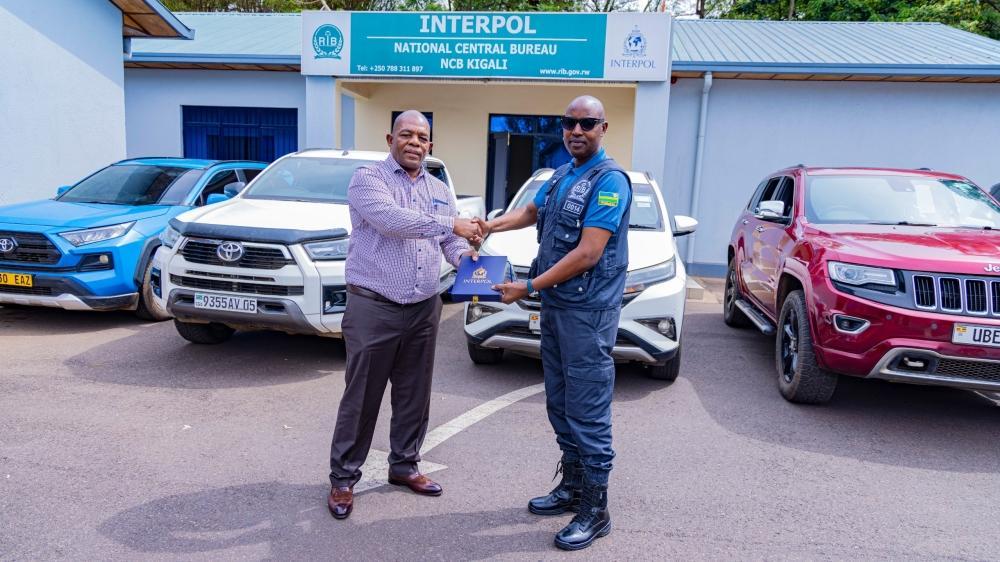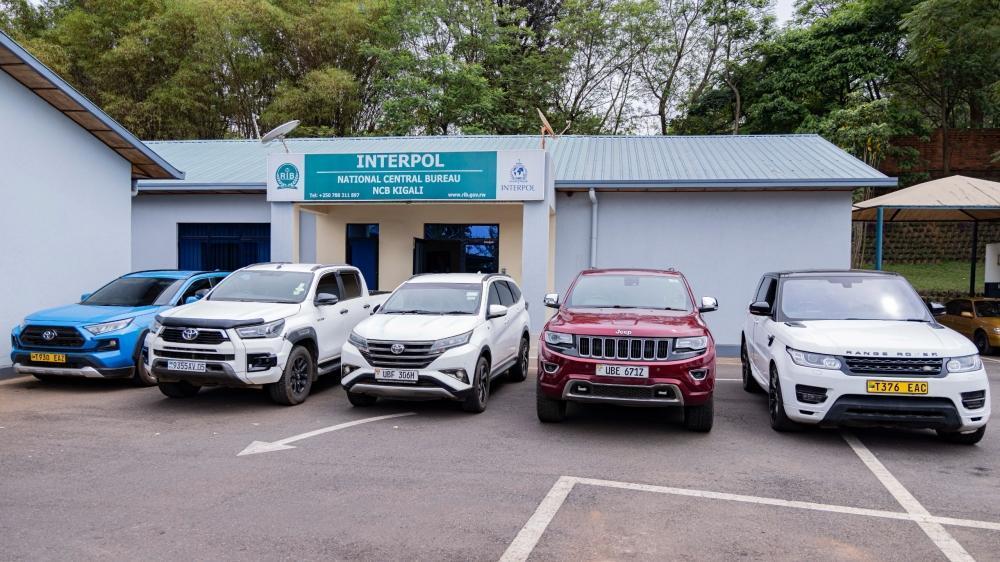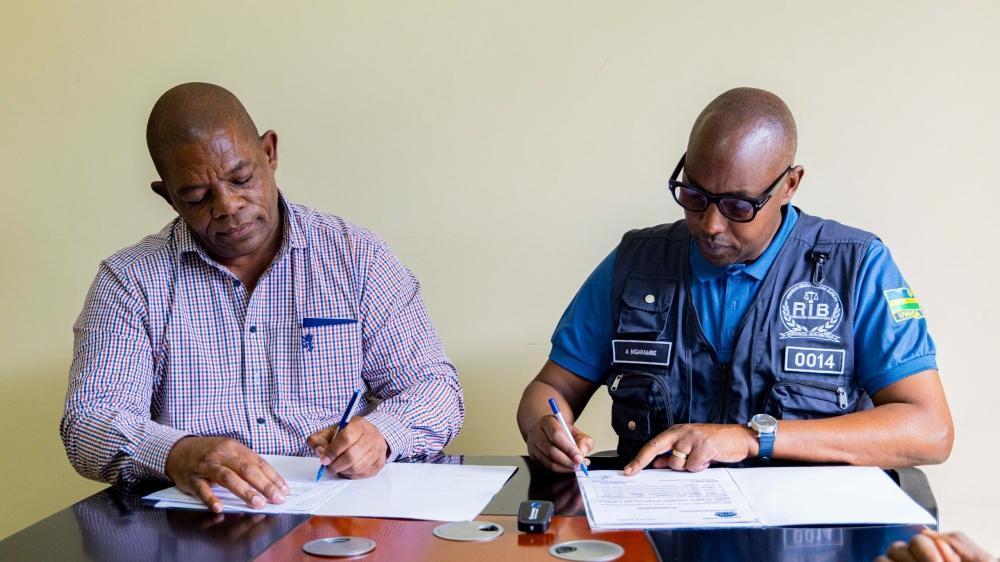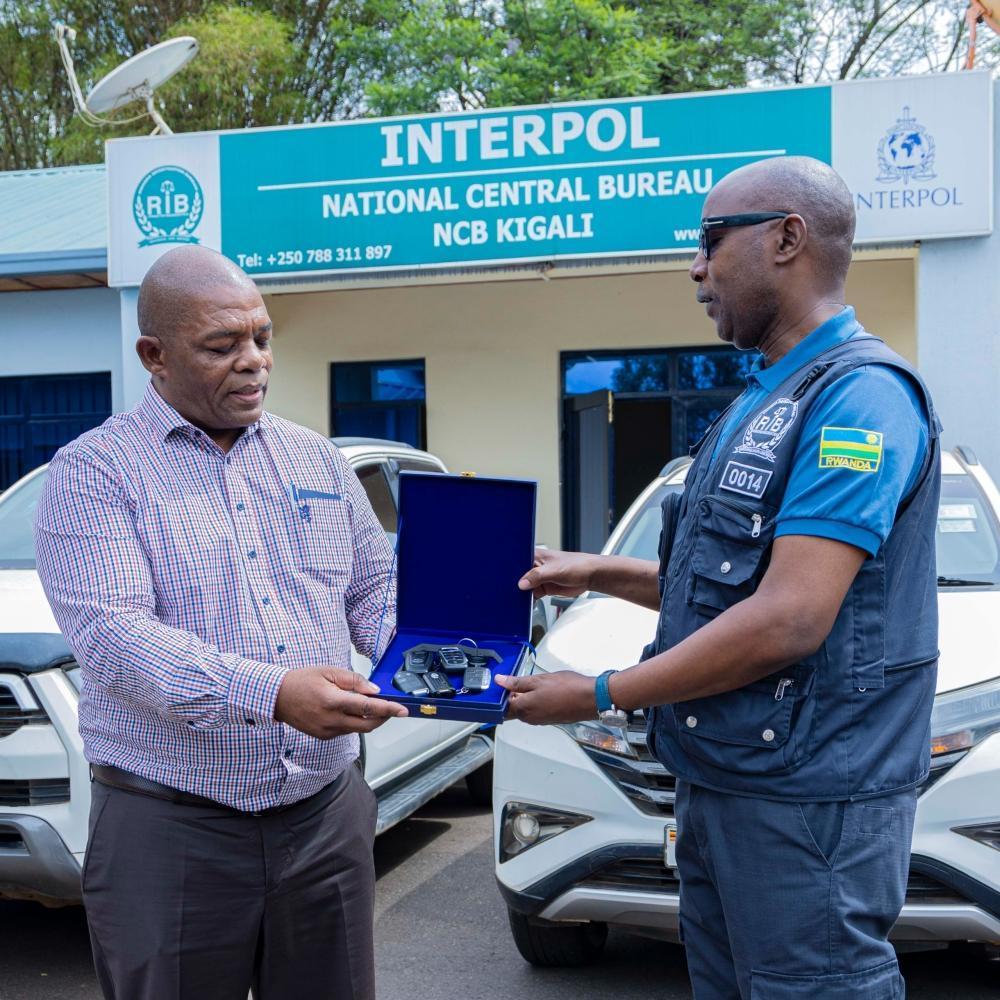Africa-Press – Rwanda. When the Rwanda Investigation Bureau (RIB) handed over five stolen cars to South African authorities on October 25, it was more than a symbolic gesture of cooperation. It was the latest success in the country’s growing effort to dismantle transnational vehicle theft networks that stretch across southern and eastern Africa.
The five vehicles—a Range Rover Sport, Jeep Grand Cherokee, Toyota Rush, Toyota Hilux, and Toyota RAV4—had all been reported stolen in South Africa. They were flagged by INTERPOL’s global criminal database and seized by Rwandan authorities after crossing into the country through different border points.
While the recovery made the news, it also raised questions that RIB says it is working tirelessly to answer: How do stolen vehicles travel thousands of kilometres across several countries to end up in Rwanda, and how are they detected before being sold or re-exported?
How stolen vehicles reach Rwanda
According to Thierry Murangira, RIB spokesperson, the recently recovered vehicles entered Rwanda after being stolen in South Africa and moved through multiple countries using forged ownership and customs documents.
“These vehicles were stolen from South Africa and entered Rwanda, where they were intercepted through the i24/7 system used by all INTERPOL member countries,” Murangira told The New Times.
“Once a vehicle is reported stolen, its details are uploaded into the system, and whenever it passes through a border equipped with the i24/7 platform, it is automatically flagged and intercepted. Investigations indicated that these stolen vehicles were moved across several borders using forged documents.”
The trafficking routes are rarely straightforward. According to previous RIB and Rwanda National Police reports, vehicles stolen in South Africa have been known to move northwards through Mozambique and Tanzania or westward through Zambia and DR Congo before reaching Rwanda.
The five vehicles—a Range Rover Sport, Jeep Grand Cherokee, Toyota Rush, Toyota Hilux, and Toyota RAV4—had all been reported stolen in South Africa.
At every stage, traffickers rely on counterfeit registration papers, altered chassis numbers or Vehicle Identification Numbers (VIN), and fake export documents to disguise the vehicle’s true origin. In some cases, the stolen cars are sold to unsuspecting buyers.
Regional law enforcement agencies have described the trade as a multi-million-dollar racket run by coordinated criminal networks that exploit weak verification systems at some border points.
How the i24/7 system helps uncover stolen cars
RIB attributes most of its recent successes to the i24/7 system, a secure digital platform that allows police and investigative agencies in 190 member countries to share criminal data in real time.
“RIB utilizes the i24/7 system, which is installed at all Rwandan border posts,” Murangira explained. “The same system is used by all INTERPOL member countries. Its effectiveness depends on the accuracy of the information entered into it. The i24/7 platform is also used in the tracking of fugitives and other cross-border criminal activities.”
Rwanda Investigation Bureau’s Antoine Ngarambe, Head of the INTERPOL National Central Bureau Kigali and International Cooperation Department, hands over the stolen cars to the South African Police Service representative Lt. Col. Brian Butana Mashingo, Group Commander for International Vehicle Crime Investigations, in Kigali on Saturday, October 25. Courtesy
Through this system, RIB investigators and customs officers can instantly verify a vehicle’s registration details, chassis number, and ownership against INTERPOL’s global database. If a match is found with a reported stolen vehicle, an alert is generated, and the car is detained immediately.
The i24/7 system has been instrumental in several high-profile recoveries in recent years.
In 2023, two luxury SUVs reported stolen from Johannesburg were intercepted at the Rusumo border post. Earlier cases, reported by IGIHE and RBA, involved vehicles recovered in Kigali and Gatuna after being flagged by the same platform.
Officials say the technology has changed how RIB and the Police operate at border points, turning previously manual verification processes into digital checks that take only seconds.
How RIB and border agencies work together
RIB’s success also depends on coordination with border agencies, customs officials, and the Rwanda National Police. Major border posts such as Gatuna, Rusumo, and Bugarama are now fully equipped with i24/7 terminals that link directly to INTERPOL’s central database.
Officers stationed at these posts undergo continuous training in document verification, risk profiling, and digital investigation. Customs data from the Rwanda Revenue Authority (RRA) is cross-checked against i24/7 entries, allowing authorities to identify inconsistencies in vehicle clearance or ownership records.
“Border management today is about information and technology,” said a senior investigator familiar with the operations.
“When a vehicle crosses into Rwanda, its registration number and VIN are immediately compared with INTERPOL records. If something doesn’t match, the system alerts us, and we act right away.”
The integration of data systems among security institutions has reduced the loopholes traffickers once exploited. Even vehicles entering through unofficial crossings are more easily traced thanks to inter-agency intelligence and digital surveillance.
The handover took place at Rwanda Investigation Bureau Headquarters in Kigali on Saturday, October 25. Courtesy
Cooperation through INTERPOL and regional frameworks
Murangira emphasized that the interception of stolen vehicles is not a one-time exercise but part of broader and sustained collaboration with regional and international law enforcement bodies.
“Cooperation is grounded in the shared commitment of INTERPOL member countries to combat transnational organized crime,” he said. “RIB continues to work closely with INTERPOL and regional law enforcement agencies under this framework to strengthen preventive and investigative measures.”
Rwanda’s active participation in the 14-member Eastern Africa Police Chiefs Cooperation Organisation (EAPCCO) has enhanced intelligence sharing on vehicle theft, cybercrime, and human trafficking. Regular regional operations coordinated under EAPCCO have led to the recovery of stolen vehicles, arrests of document forgers, and disruption of smuggling syndicates.
In 2022, INTERPOL coordinated a regional sweep across East and Southern Africa that led to the recovery of more than 200 vehicles in eight countries. Rwanda was among the participants and has since adopted several of the operation’s recommendations, including faster data entry and verification at border posts.
Rwanda’s own record
Unlike other countries in the region, Rwanda has not been a significant source of stolen vehicles in recent years. Asked whether any vehicles stolen from Rwanda have ended up abroad, Murangira said such cases are extremely rare.
“As far as I am aware, there have been no such cases in the past decade,” he said. “This type of crime has been effectively eradicated, and it is now highly unlikely for a stolen vehicle to be taken out of Rwanda.”
Murangira’s assertion aligns with police data showing a sharp decline in vehicle theft since 2015. The fall has been attributed to digital vehicle registration systems, mandatory number plate tracking, and the extensive CCTV coverage deployed under the “Safe City” surveillance project.
Every vehicle registered in Rwanda is recorded in a centralized database that links to police and RIB systems. The integration makes it nearly impossible to change ownership or export a vehicle without the system verifying its legitimacy.
Rwanda’s relatively small size, efficient road network, and strong border control mechanisms have also helped contain what in other countries has become a persistent problem.
Lessons from previous recoveries
The latest handover of stolen vehicles to South Africa follows a series of similar recoveries in recent years. In 2019, RIB intercepted three cars at the Gatuna border that had been stolen in Pretoria. Two years later, another batch of vehicles was returned to Zambia under a joint investigation.
A senior RIB officer involved in previous handovers noted that traffickers are increasingly relying on sophisticated document forgery, but technology continues to outpace them.
“Five years ago, many border posts in the region still used manual paper checks,” he said. “Now, with i24/7, we can verify a vehicle’s status within seconds. Criminals are adapting, but the system is adapting faster.”
The technology behind the cooperation
The i24/7 platform is not only for stolen vehicles. It also facilitates information exchange on wanted persons, stolen passports, firearms, and terrorism-related alerts. Its secure network allows RIB and other member agencies to access INTERPOL databases, upload new data, and receive alerts in real time.
The system operates around the clock and forms part of Rwanda’s broader strategy to digitize law enforcement. RIB has expanded its cyber and digital forensic capacity, allowing investigators to trace document forgery, tampering of vehicle identification numbers, and online transactions linked to stolen assets.
INTERPOL’s own assessment of East Africa’s performance in 2024 ranked Rwanda among the fastest responders to cross-border crime alerts. The bureau’s coordination and data-sharing efficiency have made it a model in the region.
Building a culture of vigilance
Despite these successes, officials remain cautious. The profitability of stolen vehicle trafficking continues to attract criminal groups that exploit weak verification systems in the wider region.
Murangira said the key is constant vigilance and close coordination among countries.
“Our fight against cross-border crime depends on information-sharing and consistency,” he said. “Technology helps us detect stolen assets faster, but cooperation among nations is what makes it truly effective.”
He added that Rwanda’s role in such operations sends a clear message that the country will continue to cooperate closely with its neighbours and with INTERPOL to ensure that stolen property finds its way back to rightful owners.
What lies ahead
As vehicle traffickers adopt more advanced forgery and concealment techniques, RIB and its partners are turning to even smarter tools. Machine-readable license plate scanners, forensic VIN tracing, and artificial intelligence systems capable of identifying document manipulation are among the technologies being explored.
At the same time, authorities are working to sensitize the public, especially car importers and dealers, to verify vehicle histories through official databases before purchase.
For RIB, the recent handover to South Africa represents more than just a successful operation. It is proof that cross-border cooperation and digital policing can break the chain of organized crime that moves stolen property across continents.
“This cooperation shows that crime has no borders,” Murangira said. “Just as traffickers use technology and networks, so do law enforcement agencies. What matters is who uses it better.”
For More News And Analysis About Rwanda Follow Africa-Press









